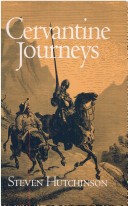Recognising that journey and movement are vital not only to the novels of Cervantes but to much of world literature as well, Steven Hutchinson develops, in this book, a problematic of the journey in relation to literature and discourse. He points out that most 20th century literary criticism has ignored the concepts of movement and change. Hutchinson focuses initially on movement as concept and metaphor, affirming its central role in all discursive activities. He draws on Heraclitus, Plato, Longinus, Rabelais, Nietzsche, Saussure, Frances Yates, Kristeva, Meschonnic and Deleuze to demonstrate the "motion" of discourse and of those engaged in it. He then turns to Cervantes' novels to show how metaphors of travel dominate the conceptualisation of the soul, desire and life processes. Viewing travel as a composite of modes of experience, Hutchinson considers the concept of errancy, the nature of "place" and the traveller's shifting relations with it, and the values that travel may have as a motion, displacement, encounter and goal. His reexamination of Bakhtin's "chronotope" in the light of Cervantes' novels reveals the dynamic character of time-spaces in which travellers move.
He shows, moreover, that worlds have the principles of becoming and dissolution inscribed in them. Reflecting on the narrative of journeys both as memory and invention, Hutchinson concludes by examining the relations between travel experience and narrative, and with a discussion of the whereabouts of writers and readers in Cervantes' novels. The narration of journeys, he argues, necessitates and encourages improvisatory writing.
- ISBN10 0299134806
- ISBN13 9780299134808
- Publish Date 31 October 1992
- Publish Status Out of Print
- Out of Print 17 October 2003
- Publish Country US
- Imprint University of Wisconsin Press
- Format Hardcover
- Pages 256
- Language English
